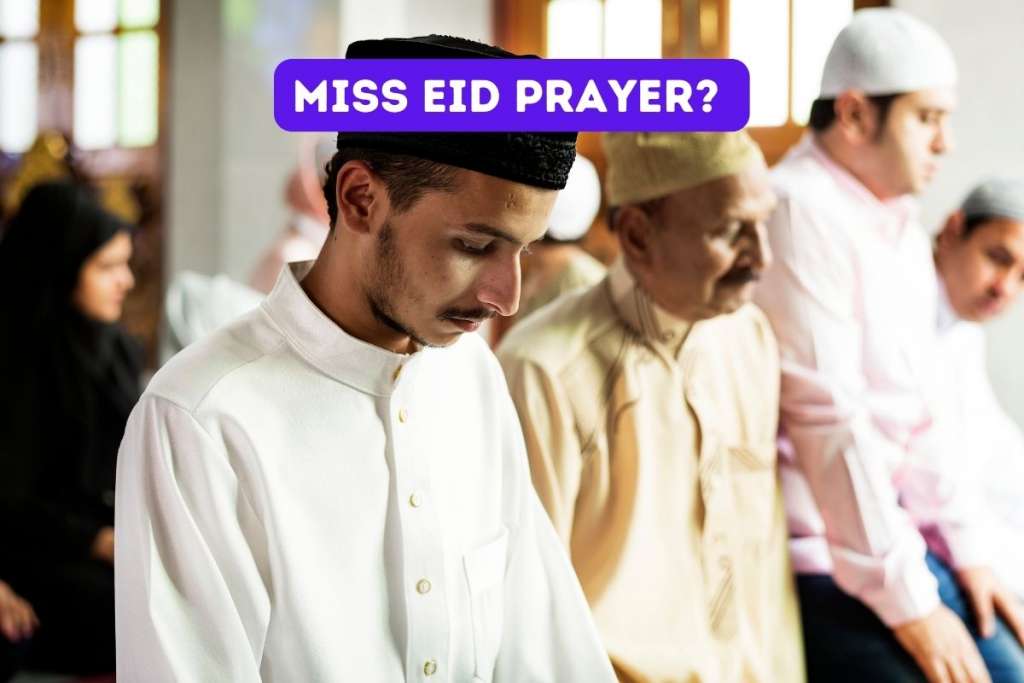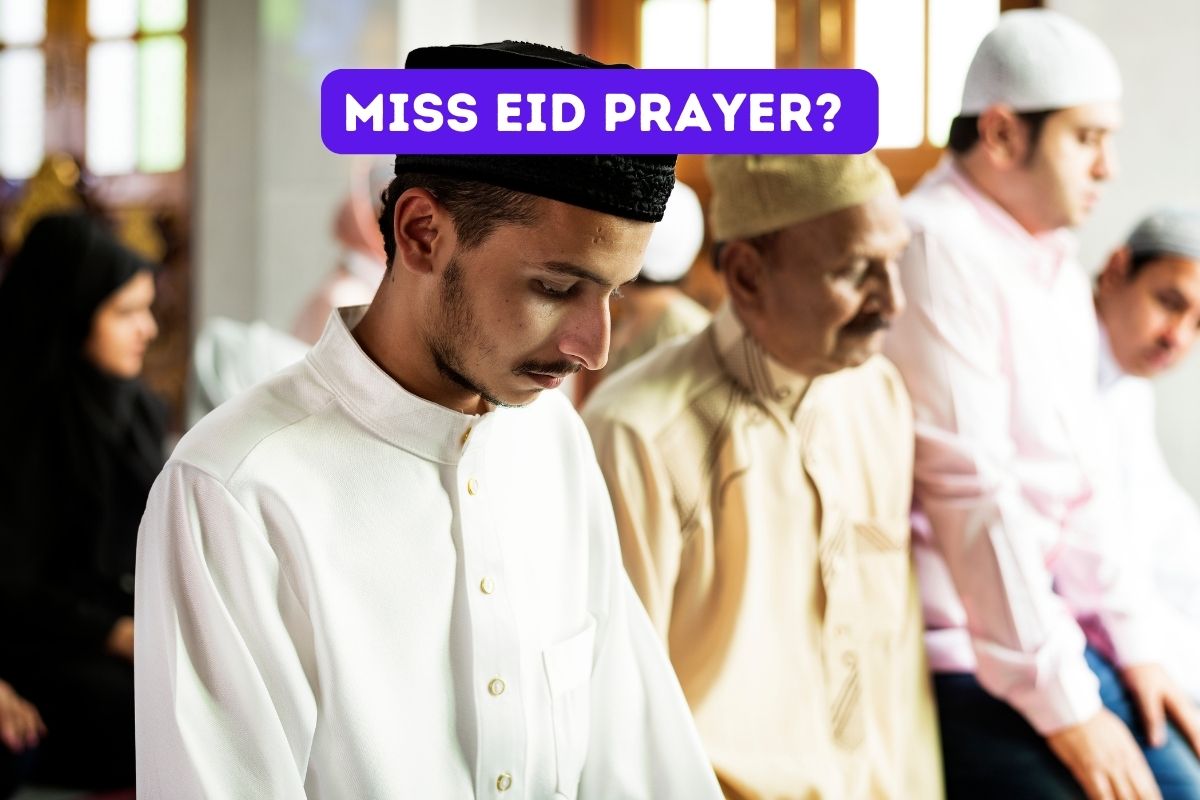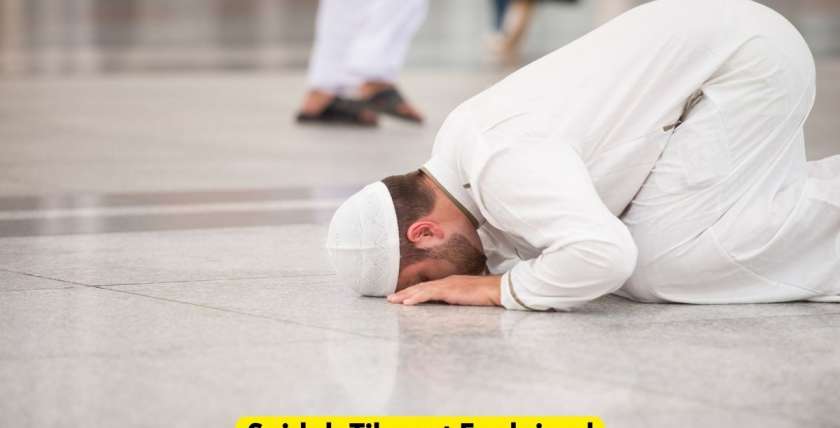Sometimes you wake up late and you miss the prayer so, what happens if you miss Eid prayer? Well, Let’s find out.
What happens if you miss Eid prayer? Nothing happens if you miss the Eid prayer, you can simply pray it at home any time until the Duhr Salah. Eid prayer is a sunnah not obligatory so don’t worry if you miss it, pray it at home and Allah will accept it from you.
Now let’s learn how to pray Eid prayer at home if you miss praying it at the mosque.
How to pray Eid prayer at home?

1- Listen to the imam in the mosque outside or open the tv on salat al-Eid/ search for it on the internet and follow the imam’s lead.
2- Eid prayer is a two-rakah prayer. Start by making your Niyah.
3- When the imam raises his hands and says “Allahu Akbar”, you should do the same. Then you will recite the al-Istiftah Dua. Afterward, the imam will say “Allahu Akbar” 3 times and you will repeat after him and raise your hands after each utterance. After raising your hands put them back down by your sides. “Allahu Akbar” means “The Lord is the most magnificent” or “Allah is the greatest.”. while al-Istiftah Dua is the dua that refers to starting the salah. There are multiple dua but here are one of them: غَيْرُكَ (Subhanaka Allahumma wa bihamdika wa tabarakasmuka, wa ta’ala jadduka wa la ilaha ghairuk).
4- Now put both your hands on your chest, place the right hand on top the left hand. The imam will now recite surah Al Fatiha and then a second Surah. The sunnah is to recite surah Al A’la in the first rakah. Listen to the imam carefully and try to focus.
5- When the imam finishes the surah, you will perform what is called Ruku, meaning that you will bow and place your hands on your knees and say “Subhaana rabiyal ‘adheem” three times. Try to make your back parallel to the ground and look at the ground. Then when you hear the imam saying “Sami Allahu liman Hamidah”, stand up again and say “Rabbana lakal Hamd”, and they both mean “Allah hears those who praise him,” and “Our Lord, praise be to You.
6- Now when the imam says “Allahu Akbar.” You will go into sujud. You get onto your knees with your forehead touching the ground and say “Subhaana rabiyal a’la” three times. Then you will sit and do another sujud. And this is the end of the first rakah.
7- The imam will say “Allahu Akbar” and you will stand back up. Then the imam will recite surah Al Fatiha and another Surah. The sunnah is to recite Surah Al Ghashiyah in the second rakah. During this listen carefully and try to focus.
8- When the imam raises his hands and say “Allahu Akbar”, you should do the same. Then you will recite the al-Istiftah Dua. Afterwords the imam will say “Allahu Akbar” 3 times and you will repeat after him. Then go to ruku after the third “Allahu Akbar”. Now say “Subhaana rabiyal ‘adheem” three times. Try to make your back parallel to the ground and look at the ground. Then when you hear the imam saying “Sami Allahu liman Hamidah”, stand up again and say “Rabbana lakal Hamd”, and they both mean “Allah hears those who praise him,” and “Our Lord, praise be to You.
9- when the imam says “Allahu Akbar.” You will go into sujud. You get onto your knees with your forehead touching the ground and say “Subhaana rabiyal a’la” three times. Then you will sit and do another sujud.
10- When you finish the second sujud sit and say the Tashahhud as follows:
التَّحِيَّاتُ لِلَّهِ وَالصَّلَوَاتُ وَالطَّيِّبَاتُ السَّلَامُ عَلَى النَّبِيُّ وَرَحْمَةُ اللَّهِ وَبَرَكَاتُهُ السَّلَامُ عَلَيْنَا وَعَلَى عِبَادِ اللَّهِ الصَّالِحِين. أَشْهَدُ أَنْ لا إِلَهَ إِلَّا اللَّهُ وَأَشْهَدُ أَنَّ مُحَمَّدًا عَبْدُهُ وَرَسُولُهُ
اللَّهُمَّ صَلِّ عَلَى مُحَمَّدٍ وَعَلَى آلِ مُحَمَّدٍ كَمَا صَلَّيْتَ عَلَى إِبْرَاهِيمَ وَعَلَى آلِ إِبْرَاهِيمَ إِنَّكَ حَمِيدٌ مَجِيدٌ. اللَّهُمَّ بَارِكْ عَلَى مُحَمَّدٍ وَعَلَى آلِ مُحَمَّدٍ كَمَا بَارَكْتَ عَلَى إِبْرَاهِيمَ وَعَلَى آلِ إِبْرَاهِيمَ إِنَّكَ حَمِيدٌ مَجِيد
Attahiyyaatu lillaahi wassalawaatu wattayyibatu. Assalaamu ‘alayka ayyuhan-Nabiyyi warahmatullaahi wabarakaatuh. Assalaamu ‘alyna wa ‘ala ‘ibaadillaahis saaliheen. Ash-hadu an laa ilaaha illallaah wa ash-hadu anna Muhammadan ‘abduhu wa rasooluh.
Allaahumma salli ‘ala Muhammad wa ‘ala aali Muhammad kama sallaita ‘ala Ibraaheem wa ‘ala aali Ibraaheem innaka Hameedun Majeed, wabaarik ‘ala Muhammad wa ‘ala aali Muhamaad kama baarakta ‘ala Ibraaheem wa ‘ala aali Ibraaheem innaka Hameedun Majeed.
Meaning: “All the compliments are for Allah and all the prayers and all the good things (are for Allah). Peace be on you, O Prophet, and Allah’s mercy and blessings (are on you). And peace be on us and on the good (pious) worshipers of Allah. I testify that none has the right to be worshipped but Allah and that Muhammad is His slave and Apostle.
O Allah! Praise Muhammad, and on the family of Muhammad, as You Praised Ibraaheem and the family of Ibraaheem; you are indeed Worthy of Praise, Full of Glory. And send blessings on Muhammad, and on the family of Muhammad, as you sent blessings on Ibraaheem, and the family of Ibraaheem; you are indeed Worthy of Praise, Full of Glory.”
11- When you finish the Tashahhud turn your face to the right and say “Assalamu alaikum Wa Rahmatullah.” Then turn your face to the left and repeat the prayer again.
Is Eid khutbah compulsory at home?
No Eid khutbah is not compulsory when you offer Eid prayer at home. So, you don’t have to give Eid khutbah or listen to it as long as you are praying at home.
Is there any prayer before or after Eid prayer?
There is no prayer to be performed before or after Eid prayer. And here are some hadiths to prove it:
Ibn Abbas narrated: “The Prophet (peace be upon him) went out (of his house) on the day of Fitr, prayed two Rakat, and did not pray before or after it.”
Ibnul-Qayyim said: “Neither he (peace be upon him) nor his companions prayed when they arrived at the Musalla – before the prayer or after it.”
Ibn Hajar said: “… In short, there is no confirmed sunnah prayer before or after the Eid prayer – contrary to those who compare it to the Jumu`ah prayer.”
For more information visit our website Quran Online or reach out to us in case you have any questions.






